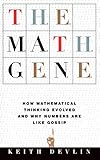

Click on a thumbnail to go to Google Books.
|
Loading... Maths Gene (original 2000; edition 2000)by Keith Devlin
Work InformationThe Math Gene: How Mathematical Thinking Evolved And Why Numbers Are Like Gossip by Keith Devlin (2000)
 None No current Talk conversations about this book.   ) )no reviews | add a review
Awards
Why is math so hard? And why, despite this difficulty, are some people so good at it? If there's some inborn capacity for mathematical thinking--which there must be, otherwise no one could do it --why can't we all do it well? Keith Devlin has answers to all these difficult questions, and in giving them shows us how mathematical ability evolved, why it's a part of language ability, and how we can make better use of this innate talent.He also offers a breathtakingly new theory of language development--that language evolved in two stages, and its main purpose was not communication--to show that the ability to think mathematically arose out of the same symbol-manipulating ability that was so crucial to the emergence of true language. Why, then, can't we do math as well as we can speak? The answer, says Devlin, is that we can and do--we just don't recognize when we're using mathematical reasoning. No library descriptions found. |
Current DiscussionsNonePopular covers
 Google Books — Loading... Google Books — Loading...GenresMelvil Decimal System (DDC)510.1Natural sciences and mathematics Mathematics General Mathematics Philosophy And PsychologyLC ClassificationRatingAverage: (3.8) (3.8)
Is this you?Become a LibraryThing Author. |
||||||||||||||||||||||||||||||||||||||||||||||||||||||||||||||||||||||||||||||||||||||||||||||||||||||||||||||||||||||||||||||||||||||